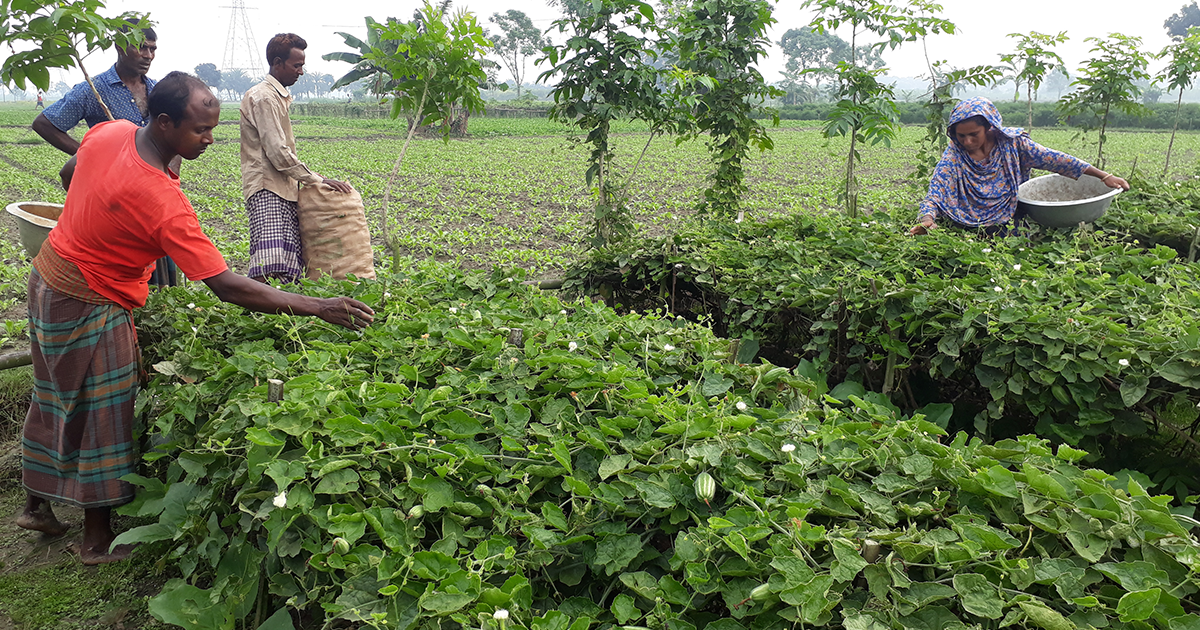While Bangladesh has witnessed some recent success in improving food security in Bangladesh, such as tripling its rice production, some challenges remain. A key challenge is that of connecting smallholder farmers to markets so that they can realise the best prices possible for their produce.
There are of course many factors that contribute to an uncoordinated market system which makes it unprofitable for smallholder farmers. Poor road networks, high transportation costs, a proliferation of actors, lack of capital and collective bargaining power to negotiate prices make it difficult for smallholder farmers to venture into markets outside of their community in hope of better prices for their produce. These challenges also discourage youth to enter farming as it’s not viewed as a profitable occupation.
So we wondered if we can break this status quo and tweak the market system in such a way that it is fair for smallholder farmers?
For the last two years, Feed the Future Developing Local Extension Capacity (DLEC) project implemented by Digital Green, the International Food Policy Research Institute, the Global Forum for Rural Advisory Services and Care International has been trying to find a solution to this challenge by piloting Digital Green’s access-to-market model in Bangladesh. In this model, a market entrepreneur is selected in each village in consultation with the community. Usually, a young farmer, this entrepreneur (aggregator) provides ‘door-to-door’ service of transporting the fresh produce from farm to market for a nominal fee.
When farmers in the community want to take their produce to the market they call the aggregator, who comes and picks-up the produce, sells it at the market on their behalf and gives the money back to the farmers the same day.
Farmers save time and cost of transportation – especially if they are vegetable growers and need to go to the market approximately every four days. By optimising transport based on the volume of produce, the aggregator too is able to control cost and gets better market prices with stronger negotiation power for bulk selling.
The model leverages digital technology to ensure transparency, efficiency and trust between the aggregator and farmer. When the aggregator collects the produce from farms, they use digital weighing machines to measure the quantity collected by each farmer. They also use separate sacks for each farmer to ensure those farmers with higher quality produce get better prices. After selling the produce, they log each transaction in the mobile app which generates an SMS receipt for each farmer. The farmer can also call the buyer and verify the price in the receipt. A mobile helpline for farmers that is channelled to a Digital Green field staff also assists with troubleshooting.
The traditional market system in Bangladesh is not gender inclusive. However, with trusted relationships with the aggregators, women heads of household were also able to get reliable access to markets and better prices for their produce and this encouraged more women farmers to cultivate home-stead gardening.
From April 2017, through this service, we have transported approx. 2.6 million kg of vegetables and ensured $1 million in payments. We have about 2,300 active farmers using the service and each farmer saves 3-5 hours of their time each week and we have seen an indication of 12-15% income increase through this service. These numbers are driven by the highly motivated, young entrepreneurs who take pride in the hard work of vegetable aggregation and transportation from dawn till dusk.
Due to the trust and respect aggregators built within their communities, DLEC was able to link them with Care Krishi Utsho, an enterprise of Care Bangladesh, to provide quality organic inputs to farmers. This partnership resulted in the aggregators gaining access to an added income source as mobile sales-agents of Krishi Utsho selling quality inputs to smallholder farmers. The aggregators also become a focal point for public sector extension agents, linking them up with smallholder farmers to provide demand-driven, timely and relevant advisory.
The success of DLEC’s market access engagement catalyzed additional interest and funding from The Government of the Netherlands to expand the program to additional geography within Bangladesh as part of the Profitable Opportunities for Food Security project implemented by ICCO Cooperation. SNV Netherlands Development Organization leveraged the DLEC aggregators to share weather advisory, plant & growth tips and pest outbreak alerts via their Fosholi app. And the School of Oriental & African Studies at the University of London is investing resources to study how to integrate nutrition, gender and climate resilience into the aggregator-led market access model.
